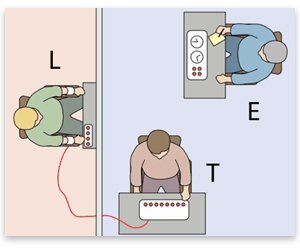
The Lucifer Effect
Have you ever stopped to question why sometimes good people turn to the evil side and inflict suffering and pain upon others? Or, most importantly, have you ever wondered whether there would be a particular circumstance which would result in you doing harm to someone else? At the same time this might feel as a very farfetched scenario to you, there is one thing it is important to keep in mind: the power of situational influences.
Peer pressure, temporary conditions and the presence of an authority figure are all factors that isolated, or even worse, combined may sap your capacity for moral judgment prompting an outcome that completely goes against your nature, your personality. The Stanford Prison Experiment and the events which the book The Lucifer Effect were based on corroborate such statement. However, there is no better way to analyse social compliance than through the infamous Obedience to Authority Study (1963) by Stanley Milgram.
The Obedience to Authority Study

So, what was it all about? Well, why don´t you try to put yourself in the shoes of the experiment’s participants:
This is the early 60’s, while reading the paper you see an add recruiting middle-class males to take part in a study about the efficiency of punishment on learning, the venue: Yale University. At your arrival a man wearing a lab coat is awaiting you with another person who together with you will contribute to this study. The scientist rolls up two little pieces of paper with the options: ‘teacher’ and ‘learner’, places them on his hand and offers them for you to pick one. You have picked the role of the teacher!
Next, you are taken to a room where the learner is all prepped up. He is bound to a chair and have electrodes attached to his body which will deliver shocks ranging from 15 volts to 450 volts (the increments are of 15 volts). Afterwards, in an adjacent room you are asked by the experimenter to sit in front o a ‘shock generator’ and are instructed to do the following: read to the learner, through a microphone, pairs of words, which later will need to be repeated by him like a memory game. For example, you will read: green-fruit, house-relax, red-clothes etc... Subsequently, you will then read for the learner only one word (house), to hopefully hear back its pair (relax). Whenever he makes a mistake, you will have to electrocute him; increasing the voltage at each mistake made.
Would you go all the way trough to 450 volts?
At 120 volts the learner begins to scream with distress, at 150 volts he asks to be released, at 330 volts ... there is no reaction, just a sinister quietness. This is when, maybe, you feel unsure of how to proceed. You look at the experimenter who is behind you noting down his observations; but he instructs you to ‘please continue’.
Would you? Well, twenty six from the forty participants continued to do so, administering shocks up to the maximum 450 volts. 5 declined to continue from the 300 volts point, 4 stopped at exactly 315 volts, and another 5 stopped between 315 and 345. No one had predicted such results (note that everyone administered shocks up to 300 volts!). Prior to conducting his experiment Milgram interviewed members from the general public, psychologists and psychiatrists. He presented the scenario and asked how far they reckoned participants would go. The general prediction was that the ‘teacher’ would stop at 140 volts.
Noteworthy that not only did these men inflicted pain on another fellow human being, but they also suffered along with it! In his notes Milgram related that 3 participants presented ‘violently convulsive seizures’ which made them call the experiment to a halt. Also, many others were clearly nervous and would not have continued if the experimenter had not requested them to do so.

By now you should probably learn that the learner was a confederate. In reality, he was never electrocuted. The screaming and all the other sounds supposedly coming from the learner were a recording, which was played over and over to every single participant in order to provide the very same experience to every single ‘teacher’.
What does all this teach us?
Stanley Milgram was a Jew very proud of his roots. The heinous crimes carried out during the Second World War alarmed him as to the evil one man can do to another. Milgram, unlike many other psychologists at the time, never believed the Nazis were intrinsically different or peculiar. He constantly pondered on the notion that they were just ordinary man caught up in the context of hate, racism and superiority. When he finally came across Hannah Arendt’s reports on the ‘banality of evil’, which were based on Adolf Eichman’s trials and particularly focused on his common man appearance, Milgram sought to find out whether evil acts are only carried out by intrinsically evil individuals.
Scarily, it turns out it doesn't, as there is a complex set of factors that play a role in such situations, these being temporary conditions, peer pressure and the presence of an authority figure. Components that according to Milgram’s findings prompt us to suspend our judgment of what is morally acceptable even according to our own beliefs and values.
[Original content by Abigail Dantes - 2017]

Reference List
Arendt, H. (1963) Eichmann in Jerusalem, London, Penguin.
Milgram, S. (1963) ‘Behavioural study of obedience’, Journal of Abnormal and Social Psychology, vol. 67, no. 4, pp. 371-8.
Milgram, S. (1974) Obedience to Authority: An Experimental View, London, Tavistock
The Stanford Prison Experiment (2015), Directed by Kyle Patrick Alvarez |Film|. United States, IFC. Films.
Zimbardo, P. (2008) The Lucifer Effect, New York, Random House.
Even if I knew about all of that before, every time I read stories connecte dto the Milgram experiment, I cannot prevent myself from thinking:
Even if the answer to the second question may seem clear, I strongly believe that we don't know what could happen 'live'. I just hope that I would have reacted as one of the good guys.
Downvoting a post can decrease pending rewards and make it less visible. Common reasons:
Submit
I would like to believe that I would have a good grip on my morals and values in that specific situation (Milgram's study), or in a similar one. However, when I see that still nowadays, when the study is replicated, the results are as shocking as those from the original research, in 1963, I do question my susceptibility to peer pressure. We all like to believe we are in charge of our decisions at all times, but it is just not as simple as that. For better or worse!
@lemouth, thank you for taking the time to read and comment :D. I immensely appreciate it!
Downvoting a post can decrease pending rewards and make it less visible. Common reasons:
Submit
And thanks to you for writing such nice posts :)
Downvoting a post can decrease pending rewards and make it less visible. Common reasons:
Submit
😊
Downvoting a post can decrease pending rewards and make it less visible. Common reasons:
Submit
A person who never made a mistake never tried anything new.
- Albert Einstein
Downvoting a post can decrease pending rewards and make it less visible. Common reasons:
Submit
Thank you sir! Nicely put.
Downvoting a post can decrease pending rewards and make it less visible. Common reasons:
Submit
is incredible how we behave as human beings, we do not care to generate pain or another human being as long as we have the confirmation or acceptance of another (whether single or group) is when the adolecencia some partner towards a prank encouraged by others if you import which of everyone will pass a certain limit, one believes that those things with the adultes are modified but sometimes they increase, everything depends on the environment in which you are developing. like who says if you develop throughout your life with scholars is likely to be a scholar, as well if you develop with thieves or assassins could also be one of them, the truth a very interesting post, thanks for sharing
Downvoting a post can decrease pending rewards and make it less visible. Common reasons:
Submit
Absolutely, thank you for your insightful comment @rusinho027!
Best.
Downvoting a post can decrease pending rewards and make it less visible. Common reasons:
Submit
Definitely an interesting study, when I read it the first time I was shocked at how high most of the teachers went to. It does make it a lot easier to believe how and why people are okay to inflict pain on others even though it's clearly sad.
Your writing skills are great, very professional. Looking forward to seeing more of your posts! Upvoted and following.
Downvoting a post can decrease pending rewards and make it less visible. Common reasons:
Submit
Your comment is very flattering @justice4. Thank you very much for the kind, encouraging words! Yes, in view of such fidings many social aspects become a little more clear, specially the ones related to wrong doing.
Best :)
Downvoting a post can decrease pending rewards and make it less visible. Common reasons:
Submit
I wonder if self-described anarchists would comply with the authority figures? My guess is no, of course, but the human brain is sometimes so hard to predict.
Downvoting a post can decrease pending rewards and make it less visible. Common reasons:
Submit
If I had to guess I would also say no; but .... as you stated, it's hard to tell!
Thanks for stopping bye @geke :)
Downvoting a post can decrease pending rewards and make it less visible. Common reasons:
Submit
Love the Milgram study! Whale done:)
Downvoting a post can decrease pending rewards and make it less visible. Common reasons:
Submit
Oh, I am very glad to hear that! 🙃
Thank you for stopping by!
:)
Downvoting a post can decrease pending rewards and make it less visible. Common reasons:
Submit
nice post @abigail-dantes
Downvoting a post can decrease pending rewards and make it less visible. Common reasons:
Submit
Thank you @khairulmuammar!
Downvoting a post can decrease pending rewards and make it less visible. Common reasons:
Submit
thank again sir @abigail-dantes
Downvoting a post can decrease pending rewards and make it less visible. Common reasons:
Submit
hmmm.. i love this type of posts from you. they are very interesting. Not to mention your writing skill.... !! :-) ( keepitcoming!)
Downvoting a post can decrease pending rewards and make it less visible. Common reasons:
Submit
Ohh! I really appreciate your support @agneslaczo.
Thanks a lot!
❤
Downvoting a post can decrease pending rewards and make it less visible. Common reasons:
Submit
were the participants paid for the experiment?
Downvoting a post can decrease pending rewards and make it less visible. Common reasons:
Submit
Yes, they were paid $4,50 🙂
Thank you for reading @trumpman.
Best :)
Downvoting a post can decrease pending rewards and make it less visible. Common reasons:
Submit
Hmmmm.. Then to answer your question, no, for 4,50 $ I wouldn't go all the way trough to 450 volts, regardless of social pressure or whatever. That's too cheap to break my moral values. Make that 10 bucks and I will go through to 450 and then some.
Downvoting a post can decrease pending rewards and make it less visible. Common reasons:
Submit
@trumpman, I think I will have to refer you to a friend of mine! :D
🙃😂
Downvoting a post can decrease pending rewards and make it less visible. Common reasons:
Submit
Does he pay people to torture other people ? XD
Downvoting a post can decrease pending rewards and make it less visible. Common reasons:
Submit
😂Oh no @trumpman, he treats people who are willing to electrocute others ( 'and then some more') for 10 bucks! Ahahahahah
You make me smile! :)
Downvoting a post can decrease pending rewards and make it less visible. Common reasons:
Submit
I like the way my neural synapses are :/ I will decline your offer, but thanks ^_^
Downvoting a post can decrease pending rewards and make it less visible. Common reasons:
Submit
This post has received a 3.04 % upvote from @buildawhale thanks to: @trumpman. Send 0.100 or more SBD to @buildawhale with a post link in the memo field to bid on the next vote.
To support our curation initiative, please vote on my owner, @themarkymark, as a Steem Witness
Downvoting a post can decrease pending rewards and make it less visible. Common reasons:
Submit
You show how timely a two-year-old ("past payout") post can be! I was thinking about this very topic all week after revisiting My Sister, the Serial Killer A Novel by Oyinkan Braithwaite. How can a good person allow her sister to get away with murder - even lie for her, even help clean up after the crime?

Now you've helped me find the answer. :)
The Lucifer Effect - #love it!
Have you ever stopped to question why sometimes good people turn to the evil side and inflict suffering and pain upon others? Yes. Yes, I wonder!!! Thank you for this post.
Downvoting a post can decrease pending rewards and make it less visible. Common reasons:
Submit
Well @carolkean, you’re most certainly making me smile tonight! Thank you for your flattering words :) I’m so pleased you liked this old post of mine :D
Also, thank you for the link. I’ll definitely follow that one ;)
Downvoting a post can decrease pending rewards and make it less visible. Common reasons:
Submit
Congratulations @abigail-dantes! You have completed some achievement on Steemit and have been rewarded with new badge(s) :
Click on any badge to view your own Board of Honor on SteemitBoard.
For more information about SteemitBoard, click here
If you no longer want to receive notifications, reply to this comment with the word
STOPDownvoting a post can decrease pending rewards and make it less visible. Common reasons:
Submit
This post recieved an upvote from minnowpond. If you would like to recieve upvotes from minnowpond on all your posts, simply FOLLOW @minnowpond
Downvoting a post can decrease pending rewards and make it less visible. Common reasons:
Submit
Excellent article!!!
Downvoting a post can decrease pending rewards and make it less visible. Common reasons:
Submit
very interesting.
I like your article @abigail-dantes
Downvoting a post can decrease pending rewards and make it less visible. Common reasons:
Submit
I am very glad to hear that @klen.civil. Thanks :)
Downvoting a post can decrease pending rewards and make it less visible. Common reasons:
Submit
your welcome friend
btw, if you have time please your visit my blog
Downvoting a post can decrease pending rewards and make it less visible. Common reasons:
Submit